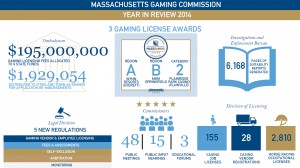GRAPHIC: MassGaming releases 2014 annual report
- January 06, 2015
- by MGC Communications
- 0 comments
The Massachusetts Gaming Commission Issues Annual Report
Report details FY14 achievements and anticipated FY15 milestones
The Massachusetts Gaming Commission is pleased to release its Annual Report recently delivered to the Massachusetts Legislature in accordance with The Gaming Act. This report details the third year of Commission operations as of the end of Fiscal Year 2014 (June 30, 2014), and also details anticipated milestones for Fiscal Year 2015.
“We are very proud of the significant progress made by the Commission and its staff towards the licensing of three world-class gaming companies that will ensure maximum benefits including job creation and economic development, said MGC Chairman Steve Crosby. “We now enthusiastically continue forward with the building of the regulatory framework that will govern expanded gaming in the Commonwealth.”
During FY14 this Commission:
- Conducted extensive technical evaluations and awarded Penn National Gaming the State’s sole Slots Parlor License. Designated MGM International as the licensee for Region B in Springfield and designated Wynn as licensee for Region A.
- Completed intensive background check (Phase 1) and investigation of all individuals (qualifiers) associated with the gaming applicants, and made determinations of suitability for ten applicants, resulting in 6,161 pages worth of reports and exhibits.
- Received Phase 2 applications for six gaming applicants in regions A, B and for the slots parlor license
- Promulgated five sets of regulations that govern the many important aspects of the gaming licensing process including (i) gaming vendor & employee licensing (ii) fees & assessments, (iii) self-exclusion, (iv) arbitration, (v) monitoring
- Distributed thirty six grants for a total of $1,929,054 to surrounding and host communities through the Grant Program
- Continued a first-of-its-kind, comprehensive and ambitious research project to study the social and economic impacts of the introduction of expanded gaming
- Assumed all responsibilities for the racing operations in the Commonwealth, and promulgated regulations and two sets of comprehensive amendments to State Racing regulations (205 CMR 3.00 and 4.00)
- Made significant progress in constructing the agency that will oversee the licensing and regulatory framework for the operations of the gaming licensees, including several key hires with significant experience in the related fields.
- Held 48 public meetings, an additional 15 public input and statutory hearings and 3 educational forums (Responsible Gaming, Internet Gaming and Horseracing).
- Developed the “Massachusetts Responsible Gaming Framework” with the ultimate goal of drafting regulations that protect those who may be at risk of experiencing problem gambling.
- Received and processed 155 license applications for gaming employees as well as 28 Non-Gaming Vendor registrations.
Major Milestones Anticipated for Fiscal Year 15:
The Opening of the Slots Parlor in Plainville is anticipated for June 2015. FY16 could bring approximately $40 million to Local Aid, and $9 million to the horse race development fund.
The phase 1 application deadline for the Category 1 License for Region C was recently extended to January 31, 2015. We will continue to monitor developments associated with this region to ensure that the Commonwealth and the region derive the anticipated benefits from expanded gaming.
We will continue to study and implement responsible gaming features. We have adopted a responsible gaming framework with the help of important stakeholders and will continue to evaluate the feasibility of features like a player management system.
Harness Racing will continue at Plainridge Race Course and increase to the statutory 105 days for calendar year 2015. We will also continue to evaluate the feasibility of Thoroughbred Racing given available monies for purses, and two placeholder applications received on Oct 1, 2014.
We continue to make significant administrative progress in the implementation and staffing of additional functions. Such functions include:
- Development, adoption and implementation of electronic gambling equipment testing protocols & procedures to ensure the machines and games on the gaming floor are operating as intended
- Promulgation of regulations which will govern operational functions at the gaming establishments, including the rules of games, slots standards, approval protocols, gaming software, gaming school certification, internal controls, reporting, cash management, licensing, tax payment, search & seizure, and research support
- Formulation and refinement of protocols and procedures in conjunction with the State Police, the Attorney General’s office and the ABCC, for the oversight of operations of gaming licensees
